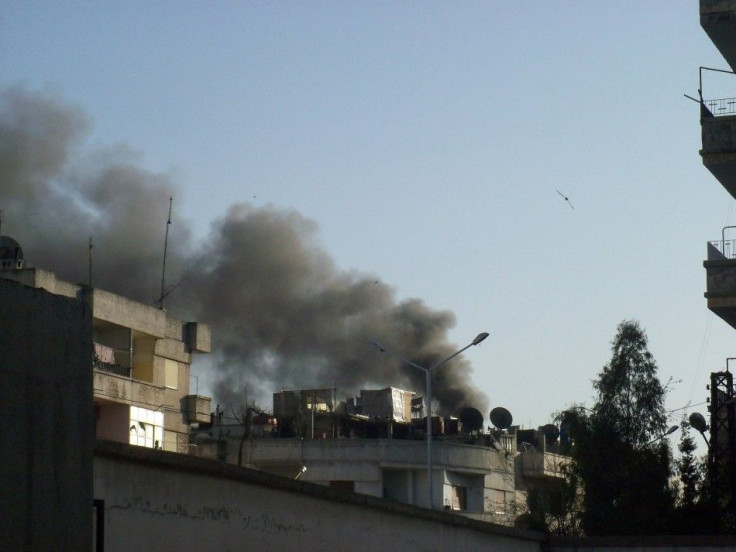Syrian Bloodshed Continues As 'Truce' Nears; Turks Protest Cross-Border Attack

Syrian troops shelled villages, fired across frontiers and were accused of massacres in the hours before a deadline on Tuesday that many doubt can usher in a U.N.-brokered ceasefire and halt a 13-month slide into all-out civil war.
Diplomats trying to contain a crisis that has inflamed the Middle East and pitched old Cold War rivals into opposing camps will not wish to abandon their most comprehensive peace plan yet. The plan's author, international envoy Kofi Annan, visits Turkey and Iran on Tuesday, while Russia hosts the Syrian foreign minister, Reuters reported.
In Damascus, President Bashar al-Assad said nothing on Monday about whether he would honor his undertaking to Annan to start withdrawing government forces from urban areas on April 10 - a deadline that diplomats say appears to give him until midnight Syrian time, or 5 p.m. ET, on Tuesday to comply.
Assad's demand on Sunday for written guarantees of good faith from the rebels -- which their leaders rejected out of hand -- as well as the hostile actions of Syrian troops on the ground, fueled doubts that Annan's schedule for the full truce to start by 6 a.m. Thursday (11 p.m. ET Wednesday) would be respected.
Syria was to have started pulling troops out of towns and cities by Tuesday to pave the way for a ceasefire to start 48 hours later.
April 10 has become void, concluded Turkish Deputy Foreign Minister Naci Koru.
Ankara, Assad's former ally and now a foe, deplored shooting that wounded five people in a refugee camp inside Turkey - in the border area which Annan, the former U.N. secretary-general, is expected to visit on Tuesday.
An angry Turkish Foreign Ministry spokesman warning that necessary steps will be taken if such incidents are repeated, the Voice of America reported.
The Turkish government strongly condemned Monday's incident, accusing the Syrian military of firing on Syrian refugees after they crossed over into Turkey. The incident occurred at the Kilis refugee camp on the Syrian border. Foreign Ministry spokesman Selcuk Unal says it was an unprovoked attack.
Some Syrian civilians were trying to enter the Turkish border, [when] some of them were wounded and shots were fired at them. Two of those injured have died after entering Turkey. And two of the Syrian nationals who were inhabitants of the camp in Kilis were wounded. One police offer and a Turkish female translator working in the camp were also slightly injured, Unal said.
The Syrian charge d'affaires was summoned to the Turkish Foreign Ministry to receive a formal complaint.
Another neighbor, Lebanon, condemned the killing of a local journalist by Syrian soldiers firing over the border.
In Washington, State Department spokeswoman Victoria Nuland said: These incidents are just another indication that the Assad regime does not seem at all willing to meet the commitments that it made to Kofi Annan.
She derided Assad's new condition for a truce as chaff to stall for time and said there was no indication of his forces preparing to withdraw.
Opposition activists in Idlib province, near the Turkish border, accused troops of mounting an offensive that had killed dozens this week, including young men rounded up and executed. Other anti-Assad groups said the army shelled a village near the central city of Hama, killing 30 people, including women and children.
The world gave Assad a deadline, said activist Mohammad Abdallah. But he sees it as an opportunity.
The escalating of the crimes, the massacres every day and now the killing of three Syrian refugees across the border with Turkey is a clear sign that the regime will not stop the killing, Radwan Ziadeh of the opposition Syrian National Council told the Associated Press.
Who can accept a regime that killed their sister, raped their mother, imprisoned their brother and committed massacres against their fathers? asked Sami Ibrahim, an activist with the Syrian Network for Human Rights in Homs.
Many rebels say they couldn't stop now if they wanted. The cost of stopping is a hundred times the cost of continuing, Ibrahim said. If they stop, this regime will follow them.
Syrian Foreign Minister Walid al-Moualem was in Moscow for talks on Tuesday with his Russian counterpart Sergei Lavrov. One of Lavrov's deputies said Russia was working with the Syrian authorities to promote talks with the opposition. But he reiterated Moscow's vocal opposition to foreign intervention.
There was also no sign the rebels were holding fire.
Opposition activists, denounced by Assad and his aides as foreign-backed terrorists, said their lightly armed and scattered forces had mounted fatal attacks on troops. They accused government forces of bombarding villages around Idlib in the northwest, as well as attacks elsewhere in the country of 22 million.
© Copyright IBTimes 2024. All rights reserved.











